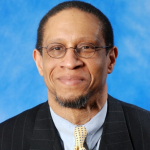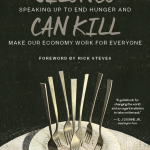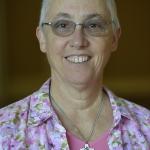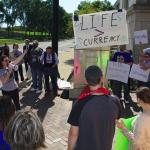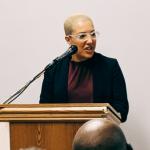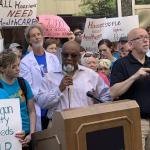In the latest installment of a series on religious socialists co-published with Religious Socialism, Lamise Shawahin and Omar Rashed explain how their Islamic faith connects with their socialist political beliefs. “Zakat definitely lines up with the principles of socialism,” says Shawahin. “All of the giving mandates of Islam are tangible ways to reduce inequality by removing wealth from places where it is being concentrated and then dispensing it to others.”
“My parents and the church taught me that you had to devote your life to something a collective that was much greater than yourself and for a purpose that lasts beyond yourself,” Sarah Ngu says. “I think DSA is asking for the same thing.”
“Jesus of Nazareth was a political revolutionary,” Hendricks writes in The Politics of Jesus. Hendricks reaches that conclusion not just by reading the words Jesus spoke, but also the historical context of his speech and actions. “The message he proclaimed not only called for change in individual hearts but also demanded sweeping and comprehensive changes in the political, social, and economic structures in his setting: colonized Israel."
“When you see the effects of for-profit healthcare over and over, when you see us treat healthcare in this country as a commodity rather than a right, it doesn’t take long before you become a single-payer advocate,” says Dr. David Green, a neurologist, member of Physicians for a National Health Plan, and longtime chair of the Detroit chapter of Democratic Socialists of America.
Too many of us are too comfortable with the warm feeling we get when we write a check to a non-profit organization or ladle out a bowl on a soup line. White Christians may be more likely to support charitable programs than our secular counterparts, but they are also less likely to support government programs that alleviate poverty. The two attitudes are interrelated, writes Rev. Arthur Simon, founder of Bread for the World.
“If you look at my life’s work, all that I am is because I am a Catholic," says health care journalist and activist Colleen Shaddox. "If you hate that I’m a socialist and that I want everyone to have their basic needs met, then you need to hate that I’m a Catholic, too. Because they are of a piece.”
Amy Hale, MD is an active member of First Presbyterian Church in Columbus, Indiana, and a primary care physician at VIMCare Clinic, formerly known as Volunteers in Medicine, where she cares for patients without a primary care physician who are uninsured or have Medicaid coverage. "Healthcare is a human right and should be accessible to all," she says. "Lack of ability to pay should not be the single determining factor in a person's ability to attain good health."
No charity program is a substitute for reliable healthcare, a social-safety net, or a job with a living wage. But many Americans assume that there must be a “program out there,” a charity that will come to the rescue of whoever needs rescuing. It turns out this is a peculiarly American illusion. Most other rich countries devote far more government funding to programs that meet social needs; they do not expect charity to replace state assistance.
After more than three decades of hands-on experience in healthcare, most of it while serving as a Sister of Providence, Sister Barbara Battista can attest to the deep connection between faith traditions and caring for the needs of those who struggle. "People of faith are called to ensure we have a healthcare system that is built on a foundation of justice.”
Faith in Healthcare is grateful to the terrific social movement weekly publication Waging Nonviolence for publishing this article by our editor. We offer it here to Faith in Healthcare readers in two parts. You can read last week’s Part One here, and here is Part Two.
Faith in Healthcare is grateful to the terrific social movement weekly publication Waging Nonviolence for publishing this article by our editor. We offer it here to Faith in Healthcare readers in two parts. This week, Part One.
Januarie York makes it clear she is a poet, not a social worker. And she rejects the label of community activist. But she feels an obligation to act, an obligation she says should be shared by the entire community. “We all need to care. Black men are humans, they are part of our society, and they are expected to keep their heads up and moving forward. But they are suffering.” She pauses, then repeats, with emphasis: “They are suffering.”
Sofia Adawy, M.D., is the Health Clinic director of the Inner-City Muslim Action Network (IMAN), a community organization that fosters health, wellness and healing in the inner-city, including through the comprehensive health center that Dr. Adawy directs on Chicago’s South Side. We are grateful for her making the time to be the latest faith-motivated healthcare advocate and provider to participate in our Faith in Healthcare Five-Question Interview.
We all know the scenario. The one relative we never see except for holiday family gatherings is holding forth, blasting on high volume political opinions delivered straight from Fox News.
Let’s say it’s Uncle Joe at Thanksgiving dinner. He turns to you and says, “Please tell me you are not supporting that socialist Medicare for All garbage that is going to bankrupt us all, and make me wait three years for heart surgery!”
How do you respond?
The silver lining in our currently dismal healthcare system is that we have a lot of models to learn from, where other nations have done far better for far less. The common denominator among those nations is that they refuse to allow corporations to make billions and executives to make tens of millions off of relentless price-gouging of sick people. Yet those nations do follow different paths on their way to more just, affordable outcomes. Reviewing a few of the options is a useful exercise for the U.S. as we contemplate change, in part because it exposes the lie that we can’t afford to do better.
“From preachers to lawmakers to people struggling to get healthcare, multiple groups and people from all across different communities were speaking up, saying this was going to hurt thousands,” says Rev. David W. Greene, Sr. “When you get that kind of coalition together, that’s when the powers-that-be pay attention.”
Last week, Senator Elizabeth Warren became the latest in a series of candidates and economists to release a plan to pay for Medicare for All. Each of those plans features increasing taxes on wealthy individuals and corporations. Here are four reasons why that is a very good thing.
The U.S. healthcare system is far and away the most expensive in the world. And there is a fast-rising demand for workers in the field. So it seems reasonable to conclude that all critical healthcare jobs pay good wages. Sue Williams-Ward knows better. So do her two million-plus fellow home care workers who endure poverty wages and exploitation on the front lines of our healthcare system. The racism and sexism behind their struggles, and what we can do about it, are the subject of this week’s Faith in Healthcare, jointly published with Sojourners.
This week’s message is written by Melinda St. Louis, who directs Public Citizen’s Medicare for All Campaign. Melinda has spent much of her activist career organizing among faith communities. As an organizer with Witness for Peace and Jubilee USA Network, she organized with congregations and people of faith and conscience around issues of peace, human rights, and economic justice. Last year, she turned her focus to the inhumane, profit-driven private health insurance system in the United States that prioritizes profit for shareholders and massive CEO salaries over people’s health. We at Faith in Healthcare are grateful for Melinda’s tireless advocacy for healthcare justice, and for sharing this opportunity for local action with all of us.
This article by our editor, co-published with the Health and Human Rights Journal, tells the story of how two ambitious Indiana politicians set out a few years ago to undercut Medicaid in their state. Now, those two Indiana politicians, then-Governor Mike Pence and his healthcare advisor Seema Verma, have ascended to the national stage. With Pence as Vice President and Verma as administrator of the Center for Medicare and Medicaid Services, they have vowed to make their punitive, restrictive version of Indiana Medicaid the new law of the land. But patients, activists, and attorneys from Pence’s and Verma’s home state are pushing back, in the streets and in the courts. Part two of two:



